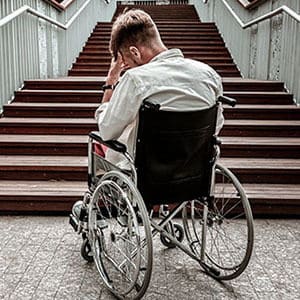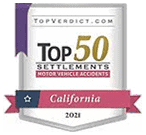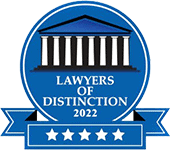 I Am Disabled, What Are My Rights If I Have A Trip And Fall?
I Am Disabled, What Are My Rights If I Have A Trip And Fall?
California Disabled Persons are protected under the Americans with Disabilities Act (“ADA”) including 42 U.S.C. section 12102, California Government Code section 12926(m), Unruh Civil Rights Act, California Civil Code section 51, et seq. (“Unruh Act”), and the California Disabled Persons Act, California Civil Code section 54, et seq. (“DPA”).
Disabled Person’s Rights
Title III of the ADA provides in pertinent part, “No individual shall be discriminated against on the basis of disability in the full and equal enjoyment of the goods, services, facilities, privileges, advantages, or accommodations of any place of public accommodation by any person who . . . operates a place of public accommodation.” (42 U.S.C. § 12182(a).) “The ADA prohibits discrimination on the basis of disability in the enjoyment of public accommodations, including with respect to access.” Jankey v. Lee (2012) 55 Cal.4th 1038, 1044.
Unintentional ADA Violation(s) Constitute Violation(s) Of The Unruh Act And DPA
A Disabled Person seeking damages for ADA violations under the Unruh Civil Rights Act is not required to prove intentional discrimination pursuant to California Supreme Court holding in Munson vs. Del Taco, Inc. (2009) 46 Cal.4th 661, 664 and 678. Under the Unruh Act, California Civil Code section 51(f) “A violation of the right of any individual under the federal Americans with Disabilities Act of 1990 (Public Law 101-336)1 shall also constitute a violation of this section.” Under the DPA, California Civil Code section 54(c) “A violation of the right of an individual under the Americans with Disabilities Act of 1990 (Public Law 101-336) also constitutes a violation of this section.”
Proving An ADA Disability Claim
A Disabled Person in a Title III ADA claim must prove three elements to prevail: (1) that Disabled Person is disabled within the meaning of the ADA; (2) that the defendant owns, leases, or operates a place of public accommodation; and (3) that Disabled Person was denied public accommodation by the defendant due to his or her disability. Chapman v. Pier I Imports (U.S.), Inc., 631 F.3d 939, 945 (9th Cir.2011); Donald v. Cafe Royale (1990) 218 Cal.App.3d 168, 183.
Element One – Disabled Person’s Disability
As to the first element, the ADA defines a disability as a “physical or mental impairment that substantially limits one or more of the major life activities of such an individual.” (42 U.S.C. § 12101(2)). The Justice Department defines an “impairment” as a condition affecting one or more of the bodies’ systems, including the musculoskeletal and neurological systems, and defines “major life activities” to include “functions such as caring for one’s self, performing manual tasks, walking, seeing, hearing, speaking, breathing, learning, and working.” (28 C.F.R. 36.104).
Element Two – Public Accommodations
The ADA Title III Technical Manual (in III-1.2000 Public accommodations) provides 12 examples of public accommodations. This is not a complete list; other businesses that fit within these categories are also considered places of public accommodation.
- Places of lodging (e.g., inns, hotels, motels) (except for owner-occupied establishments renting fewer than six rooms)
- Establishments serving food or drink (e.g., restaurants and bars)
- Places of exhibition or entertainment (e.g., motion picture houses, theaters, concert halls, stadiums)
- Places of public gathering (e.g., auditoriums, convention centers, lecture halls)
- Sales or rental establishments (e.g., bakeries, grocery stores, hardware stores, shopping centers)
- Service establishments (e.g. , laundromats, dry-cleaners, banks, barber shops, beauty shops, travel services, shoe repair services, funeral parlors, gas stations, offices of accountants or lawyers, pharmacies, insurance offices, professional offices of health care providers, hospitals)
- Public transportation terminals, depots, or stations (not including facilities relating to air transportation)
- Places of public display or collection (e.g., museums, libraries, galleries)
- Places of recreation (e.g., parks, zoos, amusement parks)
- Places of education (e.g., nursery schools, elementary, secondary, undergraduate, or postgraduate private schools)
- Social service center establishments (e.g., day care centers, senior citizen centers, homeless shelters, food banks, adoption agencies)
- Places of exercise or recreation (e.g., gymnasiums, health spas, bowling alleys, golf courses)
Element Three – Violation Of Applicable Accessibility Standards
As for the third element – whether Disabled Person was denied access on the basis of disability – is met if there was a violation of applicable accessibility standards. Chapman v. Pier I Imports (U.S.), Inc., 631 F.3d 939, 945 (9th Cir.2011); Donald v. Cafe Royale (1990) 218 Cal.App.3d 168, 183. “Discrimination” includes “a failure to remove architectural barriers… that are structural in nature, in existing facilities where such removal is readily achievable…” 42 U.S.C. section 12182(b)(2)(A)(iv) and 12183(a)(2).
Architectural Barriers
“Architectural barriers are physical features that limit or prevent people with disabilities from obtaining the goods or services that are offered. They can include parking spaces that are too narrow to accommodate people who use wheelchairs; a step or steps at the entrance or to part of the selling space of a store; round doorknobs or door hardware that is difficult to grasp; aisles that are too narrow for a person using a wheelchair, electric scooter, or a walker; a high counter or narrow checkout aisles at a cash register, and fixed tables in eating areas that are too low to accommodate a person using a wheelchair or that have fixed seats that prevent a person using a wheelchair from pulling under the table.” See ADA Guide for Small Businesses.
Treble Damages (3 Times Actual Damages) For Violations Of Unruh Act And DPA
Under the Unruh Act, a Disabled Person is entitled to recover their actual damages and an amount up to three times the actual damages for each violation of the Unruh Act, “but in no case less than $4,000…” for each and every offense and statutory attorney’s fees according to proof. Cal. Civ. Code § 52(a); Munson v. Del Taco, Inc. (2009) 46 Cal.4th 661, 667.
Under the DPA, a Disabled Person is entitled to recover their actual damages and an amount up to three times the actual damages for each violation of the DPA, “but in no case less than $1,000…” for each and every offense and statutory attorney’s fees according to proof. Cal. Civ. Code § 54.3(a). For more information on Disable Person’s Injury Claims in California, a free initial consultation is your next best step.
What To Do Next?

What To Do Next?
After your injury, it is critical to contact the Law Offices of Brett C. Drouet as soon as possible. After an initial consultation, we will discuss your goals and concerns surrounding your potential case and decide on a course of action that will most benefit you. From there, a suit will be custom-tailored to your unique situation, and as a team, we will decide how to proceed. From comprehensive guidance to an expertly trained staff, you will find no better in Los Angeles, San Diego and Southern California than at the Law Offices of Brett C. Drouet. So don’t hesitate, and call today toll free (855) 500-2255!
How To Find Us?
Los Angeles
Address: 1801 Century Park East, 24th Floor, Los Angeles, CA 90067
Phone: (626) 644-1755
Fax: (310) 356-3855
Office Hours: Monday - Friday (08:00am - 05:00pm) Weekend And Evening Appointments Available
San Diego
Address: 2772 Gateway Road, Suite 250, Carlsbad, CA 92009
Phone: (619) 844-6448
Fax: (760) 683-6087
Office Hours: Monday - Friday (08:00am - 05:00pm) Weekend And Evening Appointments Available










